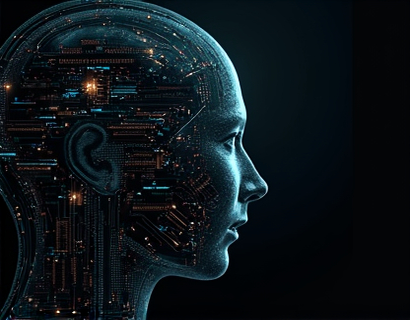Unlocking Enhanced Digital Engagement: Harnessing the Power of AI and Crypto for Next-Gen Ecosystem Experiences
The digital landscape is rapidly evolving, driven by technological advancements that redefine how we interact with online platforms and services. At the forefront of this transformation are two revolutionary technologies: Artificial Intelligence (AI) and Cryptocurrency. When combined, these technologies offer unprecedented opportunities to enhance user engagement, create more secure and transparent ecosystems, and unlock new business models. This article explores the synergistic potential of AI and crypto in crafting next-generation digital experiences, providing insights for tech enthusiasts and investors alike.
The integration of AI into digital ecosystems has already begun to reshape user interactions. AI-driven algorithms can analyze vast amounts of data to understand user behavior, preferences, and needs, enabling personalized experiences that traditional systems cannot match. Personalization is key to enhancing engagement, as users are more likely to interact with content and services tailored to their interests. For instance, AI can curate news feeds, recommend products, and even adjust the user interface based on individual preferences, creating a more intuitive and satisfying user experience.
However, personalization alone does not guarantee enhanced engagement. The trust and security of the digital environment play crucial roles. This is where cryptocurrency comes into play. Cryptocurrencies, powered by blockchain technology, offer a decentralized and transparent way to conduct transactions and manage data ownership. By leveraging crypto, digital ecosystems can ensure that user data is securely stored and managed, with users having control over their personal information. This not only builds trust but also opens up new avenues for monetization and incentive structures.
One of the most significant advantages of combining AI and crypto is the creation of decentralized applications (dApps). dApps leverage blockchain to provide a trustless environment where users can interact without intermediaries. AI can enhance dApps by providing intelligent services such as predictive analytics, automated decision-making, and enhanced security measures. For example, AI can be used to detect and prevent fraudulent activities within dApps, ensuring a safe and reliable user experience. This combination not only improves functionality but also fosters a community-driven approach, where users are active participants rather than passive consumers.
The concept of tokenization, facilitated by cryptocurrency, further amplifies the potential of AI-enhanced digital ecosystems. Tokenization involves representing assets or utilities as digital tokens on a blockchain. In the context of digital engagement, tokens can serve as incentives for user participation. For instance, users can earn tokens for contributing content, engaging in discussions, or completing tasks. These tokens can then be used within the ecosystem to access premium services, purchase goods, or even vote on platform governance. This gamification of engagement not only increases user participation but also aligns user interests with the platform's goals.
Moreover, the transparency and immutability of blockchain ensure that token distributions and user interactions are recorded and verifiable. This level of transparency builds trust among users, as they can see the exact mechanics of the reward systems and the overall health of the ecosystem. AI can optimize these token-based systems by analyzing user behavior to dynamically adjust reward structures, ensuring that incentives remain effective and engaging over time.
Another area where AI and crypto intersect is in the realm of data ownership and privacy. Traditional digital platforms often collect user data without explicit consent, leading to privacy concerns and regulatory challenges. Blockchain, combined with AI, can empower users to own and control their data. AI algorithms can help users manage their data by providing tools to anonymize, share, or monetize their information securely. For example, users can choose to sell their data to research firms or advertisers, receiving cryptocurrency payments in return. This not only gives users more control over their data but also creates a new revenue stream for the ecosystem.
The integration of AI and crypto also opens up possibilities for decentralized AI models. Traditional AI systems rely on centralized data repositories, which can be vulnerable to breaches and misuse. Decentralized AI, on the other hand, distributes data and computation across a network, enhancing security and privacy. AI models can be trained on decentralized data sets, ensuring that no single entity has control over the entire dataset. This approach not only protects user privacy but also promotes a more democratic and resilient AI ecosystem.
Furthermore, the use of smart contracts, a core feature of blockchain technology, can automate and enforce agreements within digital ecosystems. AI can enhance smart contracts by providing predictive analytics to anticipate potential issues and optimize contract terms. For instance, AI can analyze historical data to predict user behavior and adjust contract conditions accordingly, ensuring that both parties benefit from the agreement. This synergy between AI and smart contracts can lead to more efficient and trustworthy transactions, reducing the need for intermediaries and lowering costs.
The potential for innovation is vast when AI and crypto are combined to create immersive digital experiences. Virtual and augmented reality (VR/AR) platforms can benefit greatly from this integration. AI can enhance VR/AR experiences by providing realistic environments, adaptive narratives, and interactive elements. Cryptocurrency can facilitate transactions within these virtual spaces, allowing users to purchase virtual goods, pay for services, or even own digital real estate. The use of non-fungible tokens (NFTs) can further enrich these experiences by providing unique and verifiable digital assets.
In the realm of gaming, the combination of AI and crypto can lead to the development of decentralized gaming platforms where players own their in-game assets and can trade them freely. AI can create dynamic and adaptive gameplay experiences, ensuring that the game remains engaging and challenging for all players. Cryptocurrency can reward players for their achievements, creating a sustainable economic model within the game. This not only enhances user engagement but also fosters a vibrant community around the game.
For businesses and developers looking to leverage AI and crypto for enhanced digital engagement, there are several strategies to consider. First, focus on building a strong and secure blockchain infrastructure to ensure data integrity and user trust. Implement AI-driven analytics to gain deep insights into user behavior and preferences, enabling more effective personalization and engagement strategies. Develop token-based incentive systems to encourage user participation and loyalty. Explore decentralized AI models to enhance data privacy and security. Finally, stay informed about regulatory developments in the crypto space to ensure compliance and avoid potential pitfalls.
In conclusion, the convergence of AI and cryptocurrency is poised to revolutionize digital ecosystems, offering unparalleled opportunities for enhanced user engagement, security, and innovation. By embracing these technologies, stakeholders can create more intuitive, secure, and rewarding digital experiences that resonate with users in the modern landscape. As the technology continues to evolve, the potential for new applications and business models will only grow, making it an exciting time for tech enthusiasts and investors to explore this frontier.











































